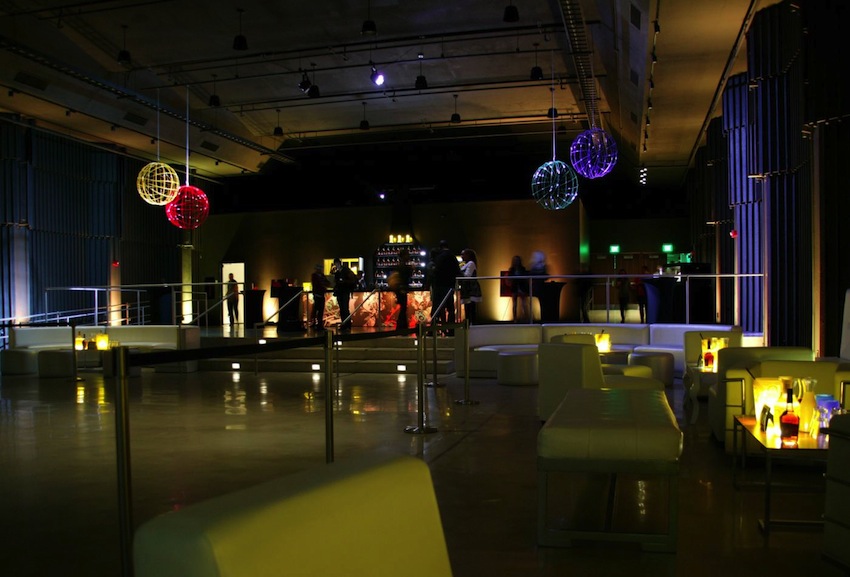Why Liquor License Laws Aren’t the Only Things That Need To Change

Space 57 Photo Via Revere Hotel
City officials in charge of making sure that bars and restaurants are complying with the state liquor laws are likely scoping out websites where organizers advertise their get-togethers and invite attendees to sign up. Then, on the night of the gatherings, police assigned to the licensing division swoop in and issue citations for various premise violations.
“I am knowledgeable that the police look at Facebook and Eventbrite as part of the monitoring they have [in place],” said City Councilor Tito Jackson. “If they have information prior to an event, we should either be picking up the phone, visiting the bar, or having a conversation and reminding people of the laws or rules and regulations, rather than show up the night of the event and shut it down.”
While it hasn’t yet been confirmed, this may have been the case for a recent Boston tech party held this past Friday at the Revere Hotel, for startup companies looking to mingle with people in other offices. The Stuart Street establishment was issued a citation by officers assigned to the Licensing Division for allegedly violating the open bar laws in Massachusetts, according to a hotel spokesman.
The Revere Hotel was host to this year’s “Boston Holiday Tech Co-Party,” at Space 57, which is organized by local startup company Promoboxx. The party is meant to bring together people in the tech community that work in offices with a limited number of employees, so they can share the same holiday experiences as larger businesses in Boston, and celebrate accordingly.
Tickets were being sold on EventBrite for $30 to $50, giving attendees access to an open bar—which is what set off an alarm for police.
“From what Boston Police said to us the night of the event, they watch EventBrite, where we sold the tickets, and they look for ‘Open Bar,’ which is their concern,” said Ben Carcio, CEO of PromoBoxx “They view it as unlimited drinking for a ticketed price.”
In Massachusetts, it’s illegal to have a public open bar event. According to the Liquor Control Act, commonly referred to as the “Happy Hour” law, set by the state’s Alcoholic Beverages Control Commission, “offering or delivering any free drinks to any person or group of persons” is prohibited.
The rules also state that “selling, offering to sell, or delivering to any person an unlimited number of drinks during any set period of time for a fixed price, except at private functions not open to the public” is not allowed. “Furthermore, no licensee shall advertise or promote in any way, whether within or without the licensed premises, any of the practices prohibited under [the law],” according to the ABCC.
Unfortunately for Carcio, who has been holding the Tech Co-Party for the last three years, he didn’t know this. He said he wished the city—if they knew about the open bar—had given them a “heads up” before they held the event, which donated a portion of proceeds to charity, to avoid embarrassment.
“If they were planning this, they could have just let us know [open bar was not allowed],” he said. “That one little thing would have prevented any of this being more than it needed to be. If the ABCC and the police department want to help the community and prevent embarrassment, they could have reached out. But they waited for it and made it awkward for everyone.”
Boston has requested a copy of the report from the night of the party, but is awaiting a reply from the Police Department. Officials from the Licensing Board, who hear cases following violations, did not return several requests for comment. A hearing for this particular violation has not been scheduled because the report has not been filed with the board.
Jackson, who was not aware of the specifics of the Tech Co-Party, has been a staunch advocate of supporting and harboring the startup community. Like Carcio, he would like to see some sort of communication happen between local law enforcement and event organizers, prior to party busts, so that everyone can better understand what the rules are.
“It sounds like this group could have easily switched and had drink tickets instead of an open bar situation, had they known. They don’t seem like scofflaw folks. If there was a prior indication this was a problem, there should have been some outreach,” said Jackson. “The proactive approach, I think, is better than a punitive approach. I think if this information is there, then it would be better to have a conversation with event organizers and the [venues], just as a reminder of the regulations.”
Jackson said he has had friends, unaware of the laws, who have hosted parties that were shut down by police because they were publicly posted on Facebook. He said the fact that police are monitoring Facebook and EventBrite isn’t the issue—since they are public invites—but the fact that police could easily pick up the phone and let someone know they may be in violation, but don’t, is worrisome.
“The underlying issue here isn’t the monitoring aspect, it’s what police do with the information once they have it,” Jackson said. “These are people who have a vested interest in following the rules because they have a liquor license. And I look at it as, how do we do the right thing by these organizations, as well as by these businesses, that give great deal of revenue to the city?”
Although Carcio’s party didn’t get shut down in the end, and the police were understanding once they “saw how it was being run,” to show there were no hard feelings, they donated $500 of the proceeds to the Boston Police Charitable Foundation.
“Everything at that point turned out fine,” Carcio said. “Besides, it’s not a great party until the police show up.”

